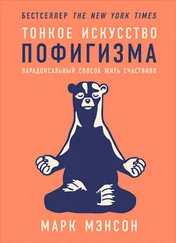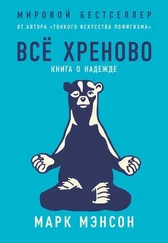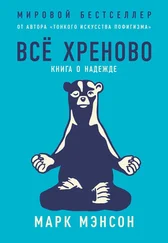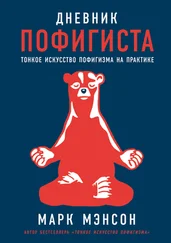Марк Мэнсон - The Subtle Art of Not Giving a F*ck
Здесь есть возможность читать онлайн «Марк Мэнсон - The Subtle Art of Not Giving a F*ck» весь текст электронной книги совершенно бесплатно (целиком полную версию без сокращений). В некоторых случаях можно слушать аудио, скачать через торрент в формате fb2 и присутствует краткое содержание. Год выпуска: 2016, Издательство: HarperCollins, Жанр: Самосовершенствование, на английском языке. Описание произведения, (предисловие) а так же отзывы посетителей доступны на портале библиотеки ЛибКат.
- Название:The Subtle Art of Not Giving a F*ck
- Автор:
- Издательство:HarperCollins
- Жанр:
- Год:2016
- ISBN:нет данных
- Рейтинг книги:5 / 5. Голосов: 2
-
Избранное:Добавить в избранное
- Отзывы:
-
Ваша оценка:
- 100
- 1
- 2
- 3
- 4
- 5
The Subtle Art of Not Giving a F*ck: краткое содержание, описание и аннотация
Предлагаем к чтению аннотацию, описание, краткое содержание или предисловие (зависит от того, что написал сам автор книги «The Subtle Art of Not Giving a F*ck»). Если вы не нашли необходимую информацию о книге — напишите в комментариях, мы постараемся отыскать её.
The Subtle Art of Not Giving a F*ck — читать онлайн бесплатно полную книгу (весь текст) целиком
Ниже представлен текст книги, разбитый по страницам. Система сохранения места последней прочитанной страницы, позволяет с удобством читать онлайн бесплатно книгу «The Subtle Art of Not Giving a F*ck», без необходимости каждый раз заново искать на чём Вы остановились. Поставьте закладку, и сможете в любой момент перейти на страницу, на которой закончили чтение.
Интервал:
Закладка:
So Mark, What the Fuck Is the Point of This Book Anyway?
This book will help you think a little bit more clearly about what you’re choosing to find important in life and what you’re choosing to find unimportant.
I believe that today we’re facing a psychological epidemic, one in which people no longer realize it’s okay for things to suck sometimes. I know that sounds intellectually lazy on the surface, but I promise you, it’s a life/death sort of issue.
Because when we believe that it’s not okay for things to suck sometimes, then we unconsciously start blaming ourselves. We start to feel as though something is inherently wrong with us, which drives us to all sorts of overcompensation, like buying forty pairs of shoes or downing Xanax with a vodka chaser on a Tuesday night or shooting up a school bus full of kids.
This belief that it’s not okay to be inadequate sometimes is the source of the growing Feedback Loop from Hell that is coming to dominate our culture.
The idea of not giving a fuck is a simple way of reorienting our expectations for life and choosing what is important and what is not. Developing this ability leads to something I like to think of as a kind of “practical enlightenment.”
No, not that airy-fairy, eternal bliss, end-of-all-suffering, bullshitty kind of enlightenment. On the contrary, I see practical enlightenment as becoming comfortable with the idea that some suffering is always inevitable—that no matter what you do, life is comprised of failures, loss, regrets, and even death. Because once you become comfortable with all the shit that life throws at you (and it will throw a lot of shit, trust me), you become invincible in a sort of low-level spiritual way. After all, the only way to overcome pain is to first learn how to bear it.
This book doesn’t give a fuck about alleviating your problems or your pain. And that is precisely why you will know it’s being honest. This book is not some guide to greatness—it couldn’t be, because greatness is merely an illusion in our minds, a made-up destination that we obligate ourselves to pursue, our own psychological Atlantis.
Instead, this book will turn your pain into a tool, your trauma into power, and your problems into slightly better problems. That is real progress. Think of it as a guide to suffering and how to do it better, more meaningfully, with more compassion and more humility. It’s a book about moving lightly despite your heavy burdens, resting easier with your greatest fears, laughing at your tears as you cry them.
This book will not teach you how to gain or achieve, but rather how to lose and let go. It will teach you to take inventory of your life and scrub out all but the most important items. It will teach you to close your eyes and trust that you can fall backwards and still be okay. It will teach you to give fewer fucks. It will teach you to not try.
CHAPTER 2 Happiness Is a Problem
About twenty-five hundred years ago, in the Himalayan foothills of present-day Nepal, there lived in a great palace a king who was going to have a son. For this son the king had a particularly grand idea: he would make the child’s life perfect. The child would never know a moment of suffering—every need, every desire, would be accounted for at all times.
The king built high walls around the palace that prevented the prince from knowing the outside world. He spoiled the child, lavishing him with food and gifts, surrounding him with servants who catered to his every whim. And just as planned, the child grew up ignorant of the routine cruelties of human existence.
All of the prince’s childhood went on like this. But despite the endless luxury and opulence, the prince became kind of a pissed-off young man. Soon, every experience felt empty and valueless. The problem was that no matter what his father gave him, it never seemed enough, never meant anything.
So late one night, the prince snuck out of the palace to see what was beyond its walls. He had a servant drive him through the local village, and what he saw horrified him.
For the first time in his life, the prince saw human suffering. He saw sick people, old people, homeless people, people in pain, even people dying.
The prince returned to the palace and found himself in a sort of existential crisis. Not knowing how to process what he’d seen, he got all emo about everything and complained a lot. And, as is so typical of young men, the prince ended up blaming his father for the very things his father had tried to do for him. It was the riches, the prince thought, that had made him so miserable, that had made life seem so meaningless. He decided to run away.
But the prince was more like his father than he knew. He had grand ideas too. He wouldn’t just run away; he would give up his royalty, his family, and all of his possessions and live in the streets, sleeping in dirt like an animal. There he would starve himself, torture himself, and beg for scraps of food from strangers for the rest of his life.
The next night, the prince snuck out of the palace again, this time never to return. For years he lived as a bum, a discarded and forgotten remnant of society, the dog shit caked to the bottom of the social totem pole. And as planned, the prince suffered greatly. He suffered through disease, hunger, pain, loneliness, and decay. He confronted the brink of death itself, often limited to eating a single nut each day.
A few years went by. Then a few more. And then . . . nothing happened. The prince began to notice that this life of suffering wasn’t all that it was cracked up to be. It wasn’t bringing him the insight he had desired. It wasn’t revealing any deeper mystery of the world or its ultimate purpose.
In fact, the prince came to know what the rest of us have always kind of known: that suffering totally sucks. And it’s not necessarily that meaningful either. As with being rich, there is no value in suffering when it’s done without purpose. And soon the prince came to the conclusion that his grand idea, like his father’s, was in fact a fucking terrible idea and he should probably go do something else instead.
Totally confused, the prince cleaned himself up and went and found a big tree near a river. He decided that he would sit under that tree and not get up until he came up with another grand idea.
As the legend goes, the confused prince sat under that tree for forty-nine days. We won’t delve into the biological viability of sitting in the same spot for forty-nine days, but let’s just say that in that time the prince came to a number of profound realizations.
One of those realizations was this: that life itself is a form of suffering. The rich suffer because of their riches. The poor suffer because of their poverty. People without a family suffer because they have no family. People with a family suffer because of their family. People who pursue worldly pleasures suffer because of their worldly pleasures. People who abstain from worldly pleasures suffer because of their abstention.
This isn’t to say that all suffering is equal. Some suffering is certainly more painful than other suffering. But we all must suffer nonetheless.
Years later, the prince would build his own philosophy and share it with the world, and this would be its first and central tenet: that pain and loss are inevitable and we should let go of trying to resist them. The prince would later become known as the Buddha. And in case you haven’t heard of him, he was kind of a big deal.
There is a premise that underlies a lot of our assumptions and beliefs. The premise is that happiness is algorithmic, that it can be worked for and earned and achieved as if it were getting accepted to law school or building a really complicated Lego set. If I achieve X, then I can be happy. If I look like Y, then I can be happy. If I can be with a person like Z, then I can be happy.
Читать дальшеИнтервал:
Закладка:
Похожие книги на «The Subtle Art of Not Giving a F*ck»
Представляем Вашему вниманию похожие книги на «The Subtle Art of Not Giving a F*ck» списком для выбора. Мы отобрали схожую по названию и смыслу литературу в надежде предоставить читателям больше вариантов отыскать новые, интересные, ещё непрочитанные произведения.
Обсуждение, отзывы о книге «The Subtle Art of Not Giving a F*ck» и просто собственные мнения читателей. Оставьте ваши комментарии, напишите, что Вы думаете о произведении, его смысле или главных героях. Укажите что конкретно понравилось, а что нет, и почему Вы так считаете.












